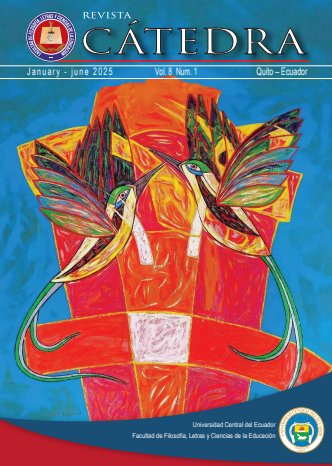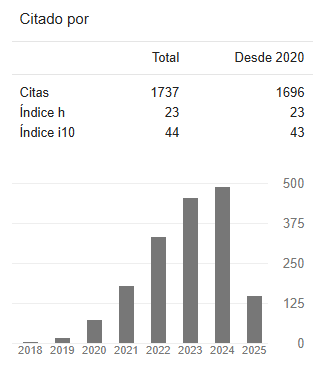Study of emotional intelligence using the Bar-on IQ inventory in students of the Faculty of Philosophy
DOI:
https://doi.org/10.29166/catedra.v8i1.7430Keywords:
Emotional intelligence, Bar-On model, emotional skills, EI measurement, holistic development, stress managementAbstract
Higher education faces challenges in the integral formation of students in an environment that demands emotional intelligence (EI) to manage complex situations. EI is essential for developing interpersonal skills, adaptability and stress management, which are fundamental for personal and professional success. Although research such as Thorndike's and Gardner's have explored social and emotional intelligence, they have not proposed specific methodologies to measure EI in the university context. This study adopts Bar-On's multifactorial model of EI, which combines emotional and social skills to cope with environmental pressures. Using a quantitative and descriptive approach, the Emotional Quotient Inventory (EQ-i)-S was used to assess five key dimensions of EI in 177 students in their last semesters at the Faculty of Philosophy of the Universidad Central del Ecuador, aged 17 to 65 years, of both genders. The Cronbach's alpha coefficient of 0.75 indicates acceptable reliability. The results showed variable levels of EI, with notable influence in the social, academic and professional spheres. It is recommended to create spaces for analysis between teachers and students to reflect on the results and work on problem areas. These initiatives should focus on developing emotional self-awareness, self-regulation and other interpersonal skills that strengthen the integral development of university students.
Downloads
References
Referencias Bibliográficas
American Psychological Association. (2010). Publication manual of the American Psychological Association (6 ed.). Washington, DC: American Psychological Association.
Bar-On, R. (2006). El modelo Bar-On de Inteligencia Emocional-Social. Psicothema, 18(Suplemento), 13-25. https://reunido.uniovi.es/index.php/PST/article/view/8415
Bar-On, R. (2006). Emotional Quotient Short Form (EQ-I:Short): Technical manual. Toronto: Multi-Health Systems.
Beteta, A., Sánchez, M. & Breso, E. (2020). Inteligencia emocional en el docente ¿Moda o necesidad?. Fòrum de Recerca. Núm. 25/2020, p. 107-108
ISSN: 1139-5486. DOI: http://dx.doi.org/10.6035/ForumRecerca.2020.25
Bisquerra, R. (2011). Educación Emocional: Propuestas para educadores y familias. España: Editorial Desclée de Brouwer.
Cazalla, N. & Morelo, D. (2014). Inteligencia emocional percibida, ansiedad y afectos en estudiantes universitarios. Revista Española de Orientación y Psicopedagogía, vol. 25, núm. 3, septiembre-diciembre, 2014, pp.
-73. https://www.redalyc.org/pdf/3382/338233061007.pdf
Delors, J. (1996). Informe a la UNESCO de la Comisión Internacional sobre la educación para el siglo XXI. Francia: Ediciones UNESCO, 36.
Férnández , P. & Extremera, N. (2005). La Inteligencia Emocional y la educación de las emociones desde el Modelo de Mayer y Salovey. Revista Interuniversitaria de Formación del Profesorado, 19(3), 63-93. http://hdl.handle.net/11162/35428
Gardner, H. (1996). Inteligencias Múltiples. Barcelona: Kairós.
Goleman, D. (1996). Inteligencia Emocional. Barcelona-España: Kairós.
Goleman, D. (2017). La Psicología de la Inteligencia Emocional. Barcelona: Editorial Salvat.
Cabrera, M. (2011). Inteligencia emocional y rendimiento académico de los alumnos del nivel secundario de una institución educativa de la región Callao. Universidad San Ignacio de Loyola para Docentes de la Región del Callao, Perú: Universidad San Ignacio de Loyola. https://repositorio.usil.edu.pe/handle/usil/320
Chamorro, A. & Oberst, U. (2008). Modelos teóricos en inteligencia emocional y su medida. Aloma: Revista de psicologia, ciències de l'educació i de l'esport Blanquerna; 14 (1)209-215. https://www.researchgate.net/publication/39399421
López-Zafra, E., Pullido, M. & Berrios, P. (2014). Adaptación y validación al español del EQ-i en universitarios. Boletín de Psicología, 110(1)29-30. https://dialnet.unirioja.es/servlet/articulo?codigo=4638071
Monje, C. (2011). Metodología de investigación cuantitativa y cualitativa. Guía didáctica. Colombia: Universidad Surcolombiana. https://www.uv.mx/rmipe/files/2017/02/Guia-didactica-metodologia-de-la-investigacion.pdf
Pérez, A. (2017). La influencia de la inteligencia emocional en el ámbito laboral. https://www.obsbusiness.school/blog/la-influencia-de-la-inteligencia-emocional-en-el-ambito-laboral
Pérez, J., Pétrides, K. & Furnham, A. (2005). La medida de la inteligencia rasgo. 81-98. España: Ediciones Pirámide.
Real Academia Española y Asociación de Academias de la Lengua Española. (2014). Diccionario de la lengua española. Madrid: Espasa Libros.
Sampieri, R., Fernández C. & Baptista, M. (2014). Metodología de la investigación, México: Mc Graw Hill Education.
Sanchéz, T. (2008). Inteligencia Emocional Autoinformada y ajuste perceptivo en la familia. su relación Cuenca: Universidad de Castilla de la Mancha. https://studylib.es/doc/6480953/inteligencia-emocional-autoinformada-y-ajuste-perceptivo
Schimel, J. (2012). Writing science : how to write papers that get cited and proposals that get funded. New York: Oxford University Press.
Ugarriza, N. (2001). La evaluación de la inteligencia emocional a través de inventario BarOn (I-Ce) en una muestra de Lima Metropolitana. Red de Revistas Científicas de América Latina, el Caribe, España y Portugal, 132-133. https://www.redalyc.org/pdf/1471/147118178005.pdfFundéu. (2011a). prefijos: cuatro claves para una buena redacción. Recuperado el 25 de junio de 2018, de https://www.fundeu.es/recomendacion/prefijos-cuatro-claves-para-una-buena-redaccion-817/
Downloads
Published
Versions
- 2025-07-02 (3)
- 2025-07-02 (2)
- 2025-01-30 (1)









